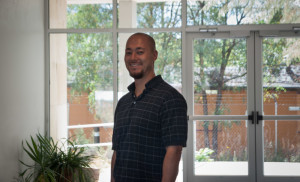Tags
Related Posts
Share This
Language As Agency
Within Alexis Hall, the tutors of the Writing Center live out a parallel reality. While they are providing invaluable assistance in writing, art history and math, they also are engaged in a mission of their own—one that aims to empower students and allow them to speak confidently about their art. More is offered at SFUAD’s Writing Center than just the standard subject-specific help: Tutors help refine artist statements, provide feedback on paintings and read scripts.
“I’d like other departments to know that we’re here to help support and serve them,” Caroline Haughton, the faculty consultant to the Writing Center, says. Haughton, who also works as a tutor in the Writing Center, stresses that they have something to offer every department. “I want all of our students to not only be able to articulate their ideas well in their assignments, but to leave this school feeling powerful that they’ve mastered some part of language.” Part of that power comes from being able to articulate ideas and the scope of their portfolios. Additionally, tutors are also available to assist students with improving study skills, note-taking, looking up scholarly essays, organization and other soft skills that nonetheless may assist in their academic success.

Hideki Nakazono is the director of the Writing Center in Alexis Hall. Photo by Sasha Hill
Though improved grades may be the goal for many, Hideki Nakazono, director of the Writing Center, offers an alternate perspective. “We’re in the business of enabling people to be able to communicate their beliefs and to be able to have persuasiveness and have that authority when they do so,” he says. It’s the difference between making better writing and making a better writer, emphasizing the creator rather their end product. The power of language is central to both Nakazono and Haughton’s vision for the Writing Center. “Language helps you have agency,” Haughton says, and Nakazono agrees, adding that while there are varying degrees of what writing will achieve for a single person, what matters most is the empowerment that writing represents. The potential influence was so felt that retired professors outside of the SFUAD community offered their services, knowing what positive results a writing center can bring. In a questionnaire completed at the end of each tutoring session for the first year of service, 99 percent of students said they planned to return or had returned.

Caroline Haughton works as a faculty consultant at The Writing Center currently in Alexis Hall. Photo by Sasha Hill
Even from a tutor’s perspective, there are innumerable benefits. For anyone with an interest in teaching, working at the Writing Center is an opportunity to gain exposure to education methods. Haughton refers to the act of tutoring as “insightful play,” playing with language while continuing to be of assistance to their community. It’s a hidden benefit that gets overlooked until circumstances pit a student on the other side of the desk. In order to become a tutor in the first place, students must be upperclassmen and must submit a formal writing sample and resume, as well as receive a recommendation from a faculty member.
Once their position is secured, Haughton and Nakazono hold weekly meetings for the purpose of training their tutors. The subject of these meetings shifts over the course of a school year, beginning with the how-to basics of tutoring and eventually venturing into the land of theory, exploring race, gender, and English as a second language. According to Haughton, with students of such varied backgrounds coming into the Writing Center, it’s important that tutors know how to be respectful of different identities and “how to celebrate those within the space of writing.” Later, the tutors may explore how different identities are expressed within an essay or a short story, which Nakazono says will help tutors “enable other people to recognize and utilize their voice to its greatest effectiveness.”
If last year’s goal was to provide needed assistance for students to achieve their goals with writing, then the goal for year two has expanded to intersect with every department on campus and also give students the confidence to use their unique voices. No matter the discipline they hail from, every student can benefit from the services of the Writing Center and the step toward agency that it offers.

Alexis Hall is home to SFUAD’s Writing Center. Photo by Sasha Hill






 Jackalope Magazine is the student magazine of Santa Fe University of Art and Design. Building on the interdisciplinary nature of our education, we aim to showcase the talent of our university and character of our city.
Jackalope Magazine is the student magazine of Santa Fe University of Art and Design. Building on the interdisciplinary nature of our education, we aim to showcase the talent of our university and character of our city.
0 Comments
Trackbacks/Pingbacks